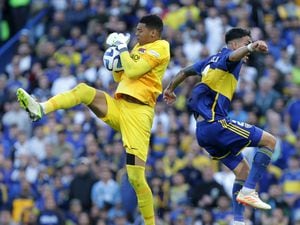Sky Sports Johnny Phillips: VAR won’t be going away - neither will controversy
Half a dozen FA Cup fourth-round ties are using VAR this weekend, in the most high-profile round of fixtures to facilitate the technology in this country to date.
The biggest game of those six was Arsenal’s home match against Manchester United last night. As the game took place after the deadline for this column it is not possible to comment on how well the event went for the system.
Let’s hope another match was not overshadowed by VAR, as the third-round replay between Southampton and Derby County was.
VAR is helping with certain decisions, but there are still so many imperfections that need ironing out. Will this ever happen? For the answer to this, observers needs to look no further than one of last weekend’s NFL Conference Championship fixtures. The Conference finals – effectively the Super Bowl semi-finals – are usually the best weekend of the American Football calendar.
The NFL is the founding father and home of video replays. They were first used in 1986. No sport in the world is more experienced or has better technology than this one when it comes to the use of television. Yet, after decades of video replays they are still making big errors, owing to the laws of the game and the way they are being interpreted.
There was outrage in the aftermath of the NFC Championship final between the New Orleans Saints and Los Angeles Rams, when several on-field referees missed what appeared to be pass interference by the Rams defence late in the game. It only requires a vague understanding of American Football to follow the story.
With the score tied at 20-20, with one minute and 48 seconds left in the game, the Saints were deep in Rams territory on 3rd down and 10. The Saints quarterback threw a pass to his receiver Tommylee Lewis, who was hit by Rams defensive back Nickell Robey-Coleman before the ball reached Lewis. Just five yards from the Rams goal line. The play wasn’t flagged for a foul, even though it looked like clear pass interference.
The Saints were furious and had to settle for a field goal, instead of getting the first down that would have allowed them to run down the clock with another sequence of four downs. The Rams then had over a minute-and-a-half to get back up field to score a field goal of their own to tie the match, before going on to win it in overtime.
Each team is allowed a certain amount of television replay reviews per game, but not all incidents can be reviewed. The replay system is designed specifically to avoid having the outcome of a game determined by an obvious on-field officiating mistake. But pass interference is one of those not subjected to this.
There is a good reason why not all decisions can be reviewed. And this is an indicator of where VAR will run into trouble. American Football is one of the most stop start, made for television sports in existence. Yet, even in this technology-led climate, the NFL authorities have been particularly adamant about not wanting what it considers these ‘judgment calls’ to be re-officiated, frame by frame, replay by replay, time and time again.
They had to draw a line somewhere to protect their own officials, who were being increasingly undermined by technology. They also took into account the amount of time reviews still take, even with the best technology available.
Already, in our own football game, there are signs that the VAR is stepping in a bit too often. And, already, VAR is leading to marginal decisions being reversed when that was not what it was designed for.
What was interesting about the controversial Martyn Waghorn ‘goal’ that was awarded by the on-field officials during the Southampton versus Derby FA Cup tie but then ruled out for offside by VAR, was how marginal the decision was. The way Waghorn’s body was shaped when the frame of action was frozen for review, a tiny part of it was in front of the last defender and a small part of it was also behind the defender.
The freeze frame captured the moment the pass to Waghorn was struck, yet anyone in the football industry will tell you that the contact between boot and ball lasts for longer than a single split frame. It can last several frames. Taking all this into account, how could VAR possibly decide this was a clear and obvious error that needed reversing?
The NFL regularly changes its rules to adapt to the dynamic nature of the sport. It is prepared to tweak in order to get a fairer result. 33 years on from the first use of replay technology, there is now talk that pass interference will be considered for review next season. And there is also talk that, if this happens, it will damage the flow of the game and the integrity of the on-field officials.
VAR can provide technology but it cannot atone for human failings. They will never go away. Based on the evidence across the pond, it is not unreasonable to assume that in 20 or 30 years’ time, VAR will be a hugely integral part of English football. And it will still be causing just as much controversy as it is today.





